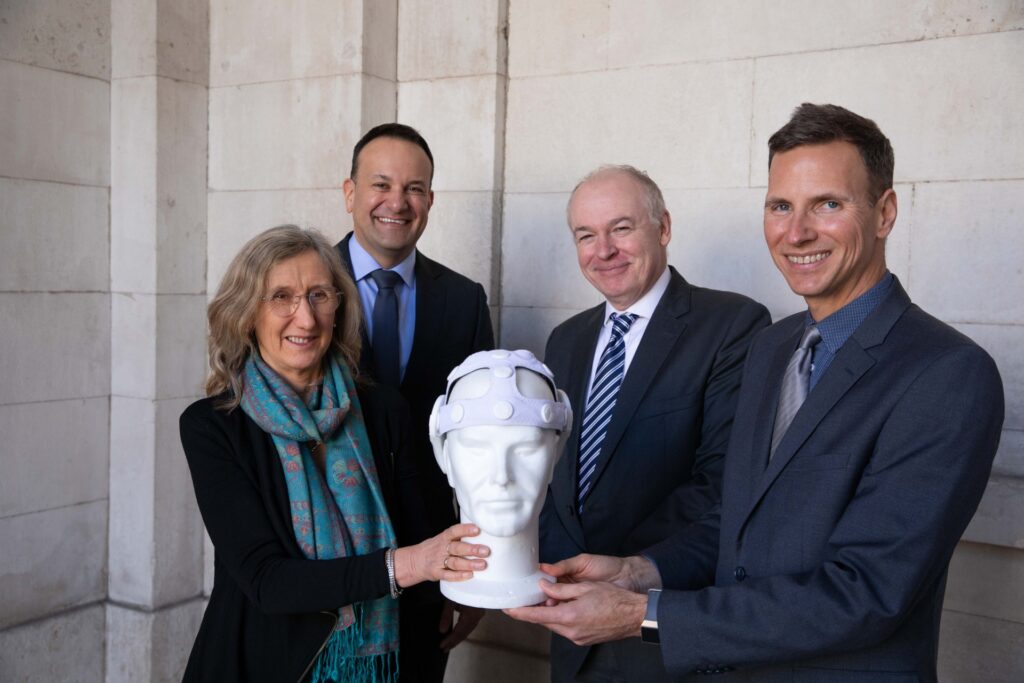
Tánaiste and Minister for Enterprise, Trade and Employment, Leo Varadkar TD hastoday launchedan ambitious academic, clinical and industry research programme that will provide new insights into our understanding of Motor Neuron Disease (MND).
FutureNeuro, hosted by RCSI University of Medicine and Health Sciences, is co-lead on the Precision ALS programme which will develop advanced data-driven prediction models for progression of the disease in patients and provide next-generation data analysis that facilitates clinical insights and treatment for Motor Neuron Disease, also known as Amyotrophic Lateral Sclerosis (ALS).
Two SFI Research Centres, ADAPT and FutureNeuro, lead the programme which involves world class Irish-based researchers in clinical science, data science and artificial intelligence (AI). The researchers will work in partnership with TRICALS, an independent consortium of leading ALS experts, patients and patient advocacy groups across Europe. National and international industry partners and charities including patient organisations are also actively participating.
The research is supported by the Irish Government through a Science Foundation Ireland investment of €5 million which will be leveraged with an additional €5 million from industry partners.
Speaking at the launch, Tánaiste and Minister for Enterprise, Trade and Employment, Leo Varadkar TD said: “This project straddles clinical research and industry, and will combine the best of our technologies, the best of our ideas, and the best of our medical expertise with the potential to change lives for the better. It will develop tools that facilitate clinical trials based on precision-medicine, and has the potential to produce benefits for other rare conditions and diseases, supporting job creation and reducing drug costs.”
Precision ALS will provide an innovative and interactive platform for all clinical research in ALS across Europe, that will then harness AI to analyse large amounts of data. As the largest international multimodal dataset aimed at precision medicine for this condition, Precision ALS will address the issues with gathering new data at scale in a timely and cost effective-manner across multiple international sites in order to present that data in real time to clinical scientists.
ALS/MND causes progressive decline in movement, cognition and behaviour. Although uniformly terminal, life expectancy can vary from three months to many years from first symptom, and there are no effective treatments. Irish researchers, along with their European collaborations in ALS/MND, have shown that the disease is caused by variable combinations of faulty genes that likely interact with lifestyle and environment. Precision ALS will provide the technology to improve our understanding of how these factors impact the development of the disease. This in turn will inform which treatments will work for each individual, instead of a one-size-fits-all approach.
Professor David Henshall, Director of the SFI FutureNeuro Centre for chronic and rare neurological disease and Professor of Molecular Physiology and Neuroscience at RCSI University of Medicine and Health Sciences said: “The launch of Precision ALS marks an important step towards achieving FutureNeuro’s mission to change the patient journey for high-burden neurological disease. MND or ALS is one of the main brain diseases of focus at FutureNeuro where research by Professor Orla Hardiman (Precision ALS Lead), Professor Jochen Prehn and others in the Centre have led to advances in understanding disease mechanisms, predicting disease course and new ways to improve care and extend lives. A key focus has been on better data-driven approaches that will provide the right drug for the right patient at the right time.
“By working with ADAPT, this unique collaboration between clinicians, computer and data scientists is ideally positioned to bring about change and draws on our Centre’s reputation and capabilities in genomics, deep phenotyping, cognitive profiling, neuroelectrical signalling and imaging analysis and expertise in design-thinking and ethnography.”
Commenting on today’s launch, Professor Fergal O’Brien, Deputy Vice Chancellor for Research & Innovation, RCSI, University of Medicine and Health Sciences said: “Precision ALS is aligned with RCSI’s mission to deliver impactful research to address global healthcare specifically in the area of neurological and psychiatric disorders, one of RCSI’s priority research areas. In RCSI, the Precision ALS research led by Professor Jochen Prehn, will focus on the evaluation of novel biomarkers including microRNA, for ALS, and the development of data-driven prediction models that provide individual patient forecasts of ALS progression. By leveraging our world-class expertise in neurological research, FutureNeuro and RCSI can further drive improvements in care for people with Motor Neuron Disease through this exciting new programme. ”
Speaking at the launch, Professor Philip Nolan, Director General of SFI said: “The SFI Research Centres were developed to create critical mass of excellent research in areas of national importance, and to ensure this research has tangible benefits for our health, our society and our economy through collaboration between academia, Government and industry across the island of Ireland and internationally. I am delighted to welcome the launch of Precision ALS, which will deliver outstanding science in the area of personalised and precision medicine, focused on neurodegenerative disease. This collaboration will directly benefit healthcare and patient communities, and yield new knowledge, approaches and treatments with the potential to improve the lives of many.”
Supporting the Precision ALS programme, Simon Harris T.D. Minister for Further and Higher Education, Research, Innovation and Science said: “The Covid-19 pandemic has taught us the value of research and the difference it can make to people’s lives. This is a perfect example of the impact research and innovation can have. By supporting and harnessing these types of advanced research projects we will ultimately see the benefits across society.”
On completion, Precision ALS will be a first-in-kind modular transferable pan-European ICT framework for ALS that can be easily adapted to other diseases that face similar precision medicine-related challenges.